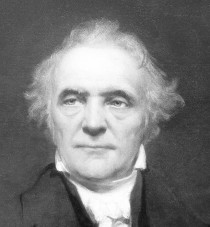
Thomas Chalmers, the first Moderator of the Free Church of Scotland after the Disruption, and the man who ‘was at the centre of a recovery that brought the churches in Scotland from mediocrity, indifference and unbelief, to new conditions of spiritual vitality’, was born in Anstruther, Fife in 1780. It was a time when true gospel preaching in Church of Scotland parishes was the exception rather than the rule, and the deadening influence of Moderatism held sway.
Before he was twelve years old, Chalmers entered the University of St Andrews, ten miles from his birthplace in Fife, and at fifteen he commenced the study of theology with a view to making the ministry his profession. At the age of nineteen he was licensed to preach and in 1802 was elected to the country parish of Kilmany, in Fife. In the meantime he had abandoned the beliefs of his godly father and succumbed wholly to the Moderate school.
Chalmers was ambitious and coveted distinction in the academic world. With this goal in view his main studies remained mathematics, chemistry and geology, and for as long as six months in a year he might be absent from his parish in order to teach in St Andrews. When he was at home he acted on the belief that two days in the week were quite enough for religious duties; sometimes his sermon preparation, such as it was, had to be done on the Sunday morning. For his first seven years at Kilmany Chalmers had no personal conversation with people about their souls, and from the pulpit he would warn his congregation of such evangelical authors as John Newton. Anything like evangelism he openly nauseated.
In 1808, family bereavements and illness in which his life hung in the balance began a profound change. After six months’ absence from his pulpit, the congregation saw a very different minister, and one whose muffled figure, walking slowly to the church in the summer of 1810, revealed him to be the invalid that he was. Chalmers now spoke of new themes, and chiefly of the shortness and insignificance of time and of the nearness and magnitude of eternity. Gradually the way of salvation by faith in the atonement of Christ was opened up to him, and before the close of the year 1811, when he was thirty-one years of age, his journal records the joy of assurance and of full commitment:
O God, make me feel the firmness of the ground I tread upon, and enable me to give all my mind to Thy Word. Above all, may I never recede by a single inch from my Saviour.
At no point did Chalmers’ life remain the same. Family prayer was established twice a day; anxiety appeared for the souls of others; parish visitation, formerly accomplished in a fortnight each year, became regular and earnest work; and the impenitent dying were warned with tears. His beloved science books now lay closed; instead there was the Westminster Confession of Faith, Jonathan Edwards, John Owen, John Calvin, the once-despised Newton, and supremely, the Bible itself, which he began to read and memorize with an intensity that astonished those who had known his former interests. People in the parish began to be changed and converted, too.
In 1814 Chalmers was elected minister of the Tron Church, Glasgow, and five years later became minister of the new parish of St John’s in the same city, where as well as preaching with passionate eloquence to a crowded church and labouring to bring the gospel not only to his hearers, but to the multitudes of Glasgow who had no church connection, he initiated experimental work for the relief of the poor. In 1823, to the surprise of many and contrary to the judgment of some of his best friends, he left Scotland’s largest city to undertake the professorship of Moral Philosophy in the University of St Andrews.
There was nothing which Thomas and Grace Chalmers felt so much as the change in the spiritual climate when they settled in Fife; Chalmers wrote: ‘Perhaps there is no town in Scotland more cold, and meagre, and moderate in its theology than St Andrews.’ Even so, he was convinced he was in the right place, and refused several invitations to return to parish ministry. He believed the surest hope for Scotland was a new generation of preachers and he was to give the best of his time and thought to helping young men. Many of his students were to be influential in the ministry of the gospel, not only in Scotland but also overseas.
The great fulfilment of his vision was, however, to come in Edinburgh. When the professorship of divinity in that university was offered to him towards the close of 1827, he accepted, and on a snow-swept November morning in the following year, he gave the first of the many hundreds of lectures which were to be heard by successive classes of students through the next twenty years.
Chalmers led the Evangelical party in the Church of Scotland and was Moderator of its General Assembly in 1832. He was elected the first Moderator of the Free Church of Scotland at the Disruption in 1843, when he was appointed Professor of Theology in New College. He lent his last energies to seeking to advance the gospel in one of the poorest districts of Edinburgh, where about a dozen adults, most of them elderly women, had commenced a witness after the Disruption, meeting in a loft. Whatever other duties necessity required him to lay down, this one he would not abandon, and when, in February 1847, a church with 132 communicants was opened in the West Port, he spoke of it as ‘the most joyful event of my life’. He died in his sleep at home on 30 May 1847.
[Adapted from ‘Thomas Chalmers and the Revival of the Church’ in Iain H. Murray’s A Scottish Christian Heritage.]